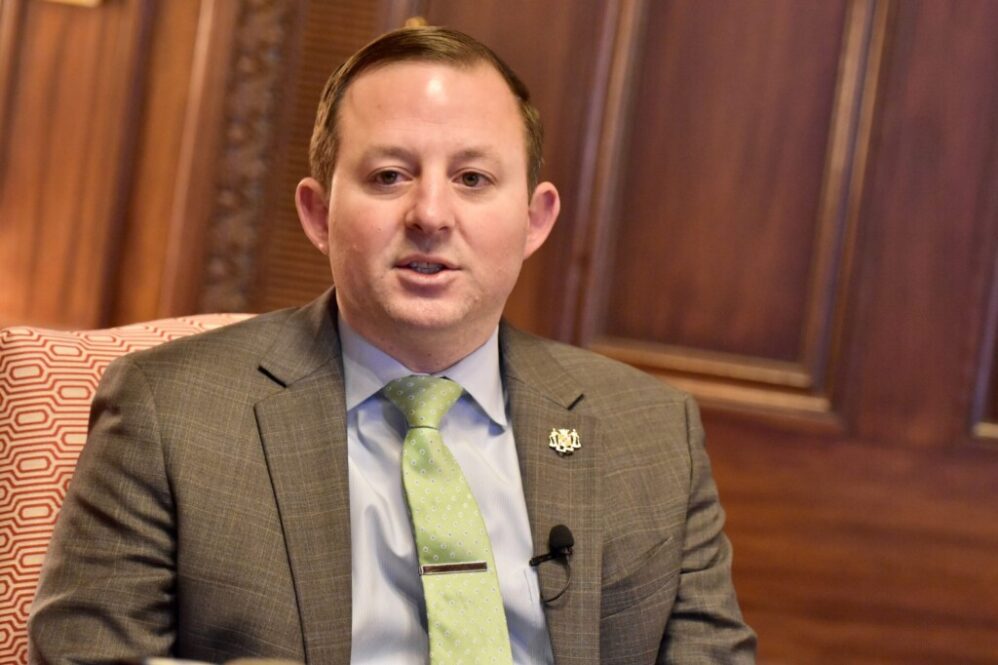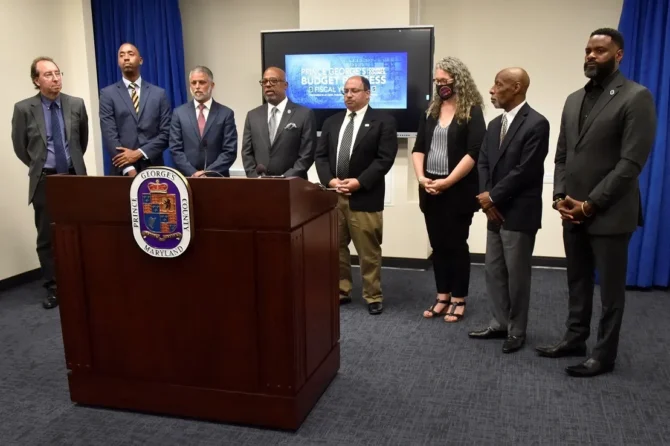MARYLAND MATTERS: The leader of the Maryland Senate said Republican appointees to the State Board of Elections will have to answer questions about involvement in the failed Jan. 6 insurrection following the recent arrest of a board member.
President Bill Ferguson (D-Baltimore City) said Tuesday the process by which the Senate reviews and confirms appointments will not change in the near term. The questions about personal involvement in Jan. 6 and a nominee’s personal beliefs about elections will be litmus tests, he said.
“Certainly, for the board of elections,” Ferguson said. “I think that that has to be a very realistic thing. We’re going to have to be more mindful to make sure that people believe in the validity of elections.”
Participation in the failed insurrection on the day Congress was to meet to certify the 2020 election would be “a disqualifier,” he said.

Federal prosecutors say this image shows Carlos Ayala on the Upper West Terrace at the U.S. Capitol on Jan. 6, 2021. Ayala was subsequently appointed to and resigned from the Maryland State Board of Elections. Image from court documents.
The FBI arrested Carlos Ayala, 52, of Salisbury, earlier this month on felony and misdemeanor charges related to his alleged involvement in the Jan. 6 attackon the U.S. Capitol. He resigned from the board the day the federal charges were made public.
Ayala joined the board last year after sailing through a confirmation hearing before the Senate Executive Nominations Committee.
He even had the support of Sen. Cheryl C. Kagan (D-Montgomery), who is active in oversight of state elections.
Following the arrest, Kagan said she was “shocked and devastated” by the charges and Ayala’s alleged participation.
Adam Wood, executive director of the Maryland Republican Party, said lawmakers are free to ask any question they wish but asserted Democrats are blocking appointments for political reasons.
“They can and should ask any questions they find relevant to the job, as they did with Mr. Ayala,” Wood said. “Nobody thought to ask any questions about January 6th last year, and they had the opportunity. They’ve already played partisan politics with nominees over personal beliefs despite nominees saying they would uphold the laws of the state.”
Ferguson, speaking to reporters, said he too was “blown away” by the allegations.
“In hindsight, do I wish that I could have gone back in time and asked did you participate in the Jan. 6 insurrection? Of course,” said Ferguson. “But in that context, we had already blocked another member who had never really participated in elections and sort of had a newfound interest in sort of questioning mail-in ballots.”
Nominations to the board of elections are made by the state’s two major political parties. Control of the five-member panel is determined by which party controls the governor’s office, with three members appointed from the party of the governor and two members appointed from the other major party.
For the first time in eight years, Democrats hold a majority on the board following the election of Gov. Wes Moore (D).
Two other Republican nominees for the board ran into trouble last year.
Moore rejected the nomination of William T. Newton last year, asserting that the frequent Republican candidate did “not meet our internal vetting standards.”
Newton’s rejection of the outcome of the 2020 presidential election and a guilty plea involving “a crime of moral turpitude,” were also cited by Moore.
Newton pleaded guilty in 2019 to charges of misdemeanor embezzlement in a case involving his mother. Newton was sentenced to probation before judgment contingent on paying $16,495 in restitution in installments of $100 per month.
The Senate Executive Nominations Committee rejected the party’s nomination of Christine McCloud. The Howard County hypnotherapist had no elections experience beyond working the 2022 election at a poll for a candidate.
During her interview with the committee, McCloud cited concerns about the state’s election process.
“I don’t think it is secure,” McCloud said last March. “I know people that have gotten mail-in ballots sent to their house and they’ve gotten several mail-in ballots. It just seems like it’s not 100%.”
A third Republican, Michelle Ewing, withdrew her nomination to the Talbot County Board of Elections after Moore said he received complaints about her support for keeping a Confederate monument on the lawn of the Talbot County courthouse. Opponents also alleged she was an election denier.
Ewing described herself as a supporter of former President Donald Trump but said she believed the elections in both Talbot County and Maryland were untainted.
She acknowledged she had concerns, shared by many other Republicans, about elections in other states including Georgia, Pennsylvania, and Wisconsin.
Ferguson told reporters he and other Democrats were mindful of the trouble with McCloud and being seen as an unreasonable roadblock to opposition party appointments.
“I think there was a hesitation from a Democratic majority to seek to block our minority party’s nominees to the Board of Elections unless it were very clear that it would be a problem,” he said. “If there had been any hint of it, of any participation during the 6th, there is no question in my mind, that would have been a nonstarter.”
Ferguson said Ayala’s presence on the board had little effect on state elections before he resigned.
“It is something that I feel I wish I would have known, and I don’t know that I would have thought to ask it differently,” Ferguson said of the Jan. 6 allegations. “I think moving forward we will ask any member if they believe in democracy, if they believe that prior Maryland elections are fair, and that people can trust them at the state and federal level. But that was pretty disheartening. It’s pretty scary.”











